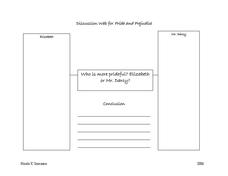Constitutional Rights Foundation
Educating About Immigration The DREAM Act
Group members role play state legislators, supporters of and opponents to the The DREAM Act (Development, Relief, and Education for Alien Minors). After listening to the arguments put forth for and against the immigration legislation,...
K20 LEARN
Trigger Warnings - Intellectual Rights and Responsibilities: Banned Books, Censorship Part 1
"Warning: Conducting this lesson plan may be harmful." Such statements, called "Trigger Warnings," are the focus of a two-part lesson plan that looks at censorship, especially the pros and cons of trigger warnings. Class members read two...
Curated OER
The Great Debate
Groups of learners investigate the persuasive genre of writing as they research and present on an issue. They research the Internet (possible websites are included) for a topic and locate information to present to the opposing team. In...
Curated OER
Pride and Prejudice: Discussion Web
Both Elizabeth and Mr. Darcy have proud moments, but who is more prideful? Explore Jane Austen's Pride and Prejudice with a discussion web that compares both characters in a brainstorming graphic organizer. Each side provides enough...
Curated OER
Bottled Water Ban
Convenience, taste, portability ... what's not to love about bottled water? Apparently, a lot. Scholars analyze the four main arguments supporting and opposing the sale of bottled water. They explore the health, environmental, and...
Curated OER
Cell Phone Radiation
Should people be more worried about cell phone radiation? Scholars read extensive background information about the issue to prepare for a class discussion or debate. As they explore the website, they learn the main arguments for and...
Curated OER
How Are Boundaries Made, Kept, Broken?
Students examine the different perspectives of Igbo women. They simulate a silent debate in response to the question, "Is the Igbo society sexist?" They write their response to the question and exchange papers with their partner as the...
Curated OER
Seeing Both Sides of an Issue
Students develop arguments on both sides of an issue to see how it feels to understand opposing views. They try to think of all the reasons they might take the opposite position on the same statement: My way of doing things is the best...
Curated OER
Crossing the Deleware: A Visual Myth or Reality
Young scholars analyze the painting Washington Crossing the Delaware.In this analyzing lesson plan, students analyze this painting that has a lot of historical inaccuracies, and then come up with a persuasive argument supporting or...
Curated OER
Emotion or Reason?
Students use persuasive devices to construct oral or written arguments. For this arguments lesson, students discuss the types of persuasive devices used in arguments and form groups to select a topic to research. Students create a...
Curated OER
Kirit C. Shah, M.D. v. Stan Harris and Nancy Harris Lesson 1: One Case, Two Sides
Students examine how lawyers prepare their arguments. They realize that both sides of a legal case may use the same cases as precedents in their positions. They find decisions of the Indiana Supreme Court and the Indiana Court of Appeals...
Curated OER
The Great Debate: Internationalists vs. Isolationists
High schoolers examine the opposing arguments of the isolationists and internationalists in 1941. In this debate lesson, the students are divided into two opposing groups representing a position in a live, in- class debate. After the...
Curated OER
I Oppose!--Counter-argument/Classifying
Students create an effective classification and counter argument. In this counter-argument lesson, students decide upon a label for at least three types of people and then describe their groups. Students describe three types of people...
Curated OER
Telling Our Stories of Giving - Writing to Persuade
After identifying the parts of a persuasive piece of writing, young writers explore different prewriting activities for the persuasive essay. They have the option to write a news article, personal narrative, or persuasive essay to...
Curated OER
Organizing A Persuasive Speech
Have the class listen to a lecture on persuasive speeches. They practice outlining and detailing the components of a persuasive speech. The lecture outline also includes suggestions for researching a topic or thesis, organizing the...
Curated OER
Teaching Debate to ESL Students
Language learners use the debate format to practice formulating, expressing, and defending their ideas. Working in teams, class members develop resolutions, use opinion indicators to express their opinions and reasons, and prepare...
Harry S. Truman Library & Museum
Marshall Plan: Convince the American People
This is an excellent resource for US history classes, especially AP history. After learning some background on the Marshall Plan, the class, divided into two groups, researches opposing positions on this aid program. Groups read and...
National Endowment for the Humanities
Chronicling America: Uncovering a World at War
As part of a study of World War I, class members read newspaper articles from the time that urge American involvement, non-involvement, or neutrality. Using the provided worksheet, groups analyze the articles noting the central argument...
Curated OER
Opposing Views on the Vietnam War
Students consider opinions regarding the Vietnam War. In this Vietnam lesson plan, students compare Nixon and Johnson's policies about the war. Students also research the anti-war movements as well as the sentiments of the those how...
Curated OER
The Union is Perpetual: Lincoln is Elected
Students view primary documents about the race for President in the time of Abraham Lincoln. In this election lesson, students prepare arguments for and against Lincoln using an analysis sheet. Students create a poster or cartoon to...
Teach Engineering
Nanotechnology Grant Proposal Writing
Please, sir, can I have a few thousand dollars for my research? The last installment in a six-part lesson has the pupils develop a grant proposal. Class members apply their knowledge of skin cancer, ultraviolet radiation, human skin, and...
Curated OER
Courts in the Classroom: Ritter v Stanton
Young scholars read the case briefs of Ritter v Stanton. They simulate the trial with classmates taking various parts such as appellant, appellee, bailiff, and justices. After conducting a mock argument, they write their own opinion for...
Deliberating in a Democracy
Voting
Young scholars read about voting rights and compulsory voting in democracies. For this voting rights lesson plan, young scholars analyze the reasons for supporting and opposing compulsory voting and discuss whether compulsory voting is...
Curated OER
What Events Led to Lincoln's Assassination?
Fourth graders use primary and secondary sources to research the assassination of Abraham Lincoln. They identify arguments supporting and opposing the position that Lincoln's assassination could have been prevented and write a report...

























